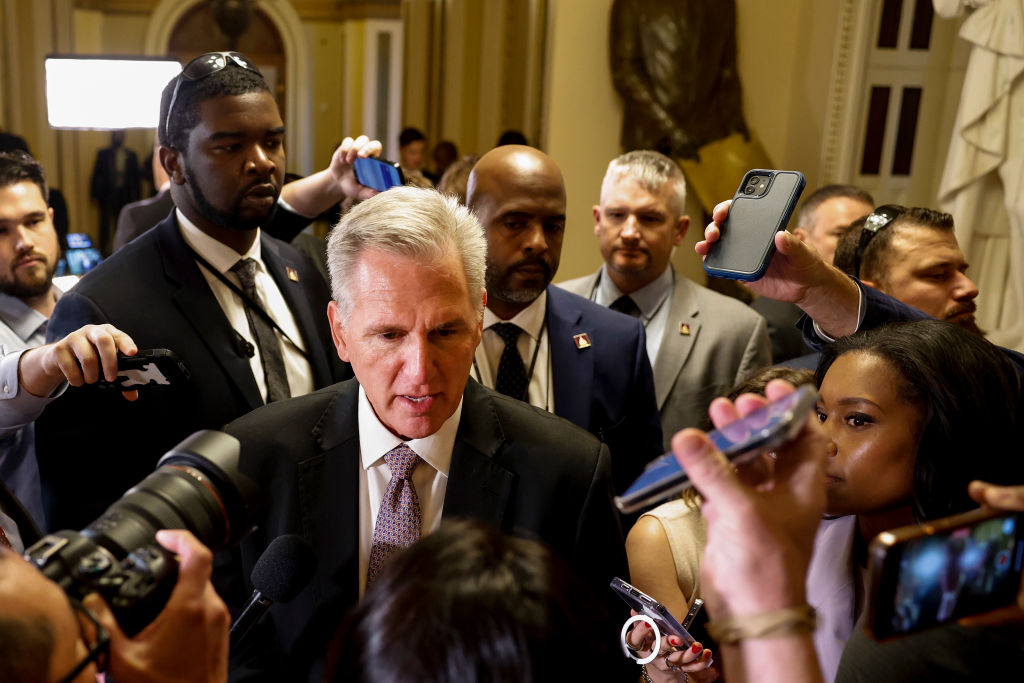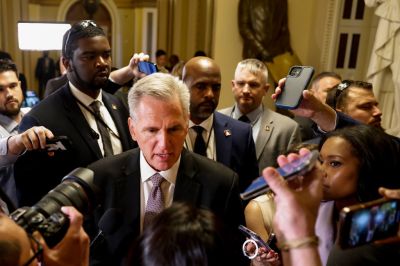Happy Monday! We hope you’ll forgive us for a more personal opener than usual, but we hope you’ll join us in congratulating longtime TMD editor, and now Dispatch executive editor, Declan Garvey, and his lovely bride Maddie, on their beautiful wedding Saturday. It was in Des Moines, so there was some talk of politics, and many of the Chicagoans wanted to talk about football despite, well, the Bears. But most of the attention was focused on the couple and the wonderful weekend. We tried to get some scandalous stories about Declan’s past but the best we could do was an anecdote about having to pay to take a cab to school because he was late and something about attempting to be cool by purchasing a fedora on a high school band trip to Hawaii. The newlyweds aren’t in Hawaii now, but we wish them a terrific honeymoon and many happy years ahead.
Quick Hits: Today’s Top Stories
- Former President Donald Trump issued a thinly veiled threat to Joint Chiefs of Staff Chairman Gen. Mark Milley Friday, seemingly in reaction to a profile of Milley published in The Atlantic the day before. Trump made an apparent reference to reporting that in 2020 Milley reassured his Chinese military counterparts that the U.S. was not preparing an attack against them after he received intelligence China believed a strike was imminent. “This is an act so egregious that, in times gone by, the punishment would have been DEATH,” Trump wrote on his TruthSocial account. “A war between China and the United States could have been the result of this treasonous act. To be continued!!!” GOP Rep. Paul Gosar echoed the former president’s rhetoric, writing in his weekly newsletter that “in a better society … General Milley would be hung.”
- Ukraine launched multiple missile strikes on Russian positions in Crimea on Friday and Saturday, damaging the headquarters of Russia’s Black Sea Fleet in Sevastopol. Ukrainian officials say that at least nine people were killed and 16 were injured—two Russian generals were among the injured, according to the Ukrainian intelligence chief Kyrylo Budano. The strikes followed President Volodymyr Zelensky’s visit to Washington to meet with lawmakers and President Joe Biden. During their meeting, Biden reportedly told Zelensky that the United States would provide Ukraine with American-made long-range missiles, Army Tactical Missiles System (ATACMS). Zelensky followed his U.S. trip with a stop in Canada where Prime Minister Justin Trudeau announced on Friday $482 million in new military aid to Ukraine over the next three years.
- House Republicans made little progress over the weekend on a plan to fund the government and avoid a shutdown. GOP hardliners maintained their opposition in the face of calls from House leadership and their colleagues in the Republican conference to relent. “I don’t want to see a shutdown, but there is no doubt in my mind that the country is headed for a shutdown, and everyone should prepare as such,” Texas Republican Rep. Tony Gonzales said Sunday. House Speaker Kevin McCarthy reversed course on Ukraine aid on Saturday, saying that he would leave the approximately $300 million in the defense spending bill instead of giving it a separate vote—the original plan he told reporters of on Friday. Republicans are planning to vote on four of the remaining 11 spending bills on Tuesday, including the defense bill.
- Sen. Bob Menendez—a New Jersey Democrat—was indicted on bribery charges on Friday. The senator is accused of taking bribes such as a luxury car, mortgage payments, gold bars, and more than $500,000 in cash in exchange for using his office and chairmanship on the Senate Foreign Relations Committee to increase U.S. aid to Egypt and provide favors to businessmen in his state. The 39-page indictment also names Menendez’s wife and three New Jersey businessmen. Menendez was indicted in 2015 on bribery charges, but the case ended in a mistrial with the judge eventually acquitting the senator of several charges and prosecutors dropping the remainder. A chorus of high-ranking Democrats including New Jersey Gov. Phil Murphy has called on Menendez to resign. The senator has stepped down as chair of the Foreign Relations Committee but said on Friday, “I am not going anywhere.” New Jersey Democratic Rep. Andy Kim announced on Saturday he would run to unseat Menendez in 2024.
- The U.S. and China have agreed to a framework for economic talks, the Treasury Department announced Friday. The countries have established two economic and financial working groups led by Treasury Secretary Janet Yellen and her Chinese counterpart, Vice Premier He Lifeng, as part of the administration’s broader initiative to improve communication with Beijing on a number of sensitive issues.“It is vital that we talk, particularly when we disagree,” Yellen said Friday.
- French President Emmanuel Macron announced Sunday that French troops will withdraw from Niger over the next two months. The decision comes after the military junta that ousted Nigerien President Mohammed Bazoum this summer pushed for a rapid French exit. It’s unclear whether the 1,100 U.S. troops currently stationed in the country will remain or follow suit.
- The United Auto Workers union (UAW) expanded its strike Friday with another 5,600 members walking off the job—bringing the total to almost 19,000. The move increases pressure on General Motors and Stellantis as now all the companies’ spare-parts distribution centers are affected by the labor action—the expanded walkouts did not include Ford, where strike leaders say more progress is being made in contract negotiations. Biden will travel to Michigan on Tuesday to join strikers on the picket line, and Trump is scheduled to speak to workers the following day.
- The Writers Guild of America reached a tentative deal with film and television studios Sunday night after a nearly five-month-long strike. “We can say, with great pride, that this deal is exceptional—with meaningful gains and protections for writers in every sector of the membership,” the union said in a statement to its members. The agreement will need to be finalized and voted on by union leadership and members before the strike is lifted.
- North Dakota Gov. Doug Burgum qualified for the second GOP presidential debate, Burgum’s campaign said on Saturday. The debate—scheduled to be held at the Ronald Reagan Presidential Library on Wednesday at 9 p.m. ET—is set to feature the same slate of candidates as the first, with the exception of Arkansas Gov. Asa Hutchinson who is expected to miss the cut.
Government Shutdown, Ahoy!

Members of Congress, like high schoolers, are perennially procrastinating on their group projects. But it goes without saying that the problem with elected representatives acting like high schoolers is that lawmakers’ group projects have much higher stakes than those of your average 16-year-old in biology class.
A shutdown seems increasingly likely as the countdown to the end of the fiscal year ticks well into the single digits—with lawmakers having passed only one of the dozen bills needed to fund the government. House Speaker Kevin McCarthy is fighting a civil war with hardline members of his own fractious, razor-thin majority who are weaponizing House procedure to keep the body from passing not just the appropriations bills, but also a “continuing resolution” (CR) to fund the government at current levels for a few more weeks to forestall a shutdown and give them more time to pass the new bills.
Most years, appropriations season runs congressional staffers ragged but doesn’t give the average American much reason to tune in. As the end of the fiscal year approaches, lawmakers haggle over what’s called “discretionary spending,” which makes up about one-third of the government’s total outlays in a year. As part of this process, they’re not touching so-called “mandatory spending,” which includes funding for entitlement programs like Social Security, Medicare, and Medicaid: That spending runs on autopilot from year-to-year without the need for congressional reauthorization and constitutes the other two-thirds of the federal government’s yearly outflow of cash. (Though Republicans once advocated reforms to the mandatory spending that drives the nation’s debt, there’s now a fairly bipartisan consensus against any serious effort to find cost savings on entitlement spending.)
Congress has only completed the funding process before the end of the fiscal year three times in the last 47 years—and not once in the 21st century. Instead, lawmakers routinely pass CRs to keep funding levels steady for several weeks or months (or even the entire forthcoming fiscal year) and extend their own deadline to negotiate and pass funding bills.
Those spending bills are not always passed individually. Often, for the sake of expediency as the clock ticks down, they’re lumped together in what’s called an “omnibus spending package”—a massive bill of bills that includes some or all of the potential funding provisions considered and voted on all at once. (The omnibus budget bill for 2023—signed by President Joe Biden in December—was somewhere in the neighborhood of 4,000 pages long and worth $1.7 trillion.) While omnibuses move through the legislative process faster than individual spending bills could, their critics also say they promote wasteful spending: Since virtually no one reads them in their entirety, they curtail debate on detailed funding provisions and make it harder for representatives to vote their consciences. Omnibuses also often have riders—legislative, rather than spending, measures that get passed alongside the budget with less pushback than if they had been passed on their own.
So what’s so different this appropriations season? The seeds of this current fight were sown in January as McCarthy tried desperately to wrangle his narrow majority to find enough votes to allow him to become House speaker. It took him a remarkable 15 ballots to win the position, and in the process, McCarthy made concessions to his hardline detractors who had been standing between him and the gavel. Among those promises was a vow to end omnibus spending bills, at least during McCarthy’s tenure, and pass all 12 funding bills individually come appropriations season.
But if lawmakers have known since January they were going to have to move all 12 bills individually, why are we so close to the deadline with only one bill passed? It has to do, at least in part, with blowback from another bruising battle for McCarthy: the June debt ceiling negotiation. As we explained last week:
Just a few months ago, a contingent of Republican rebels unsuccessfully fought McCarthy’s efforts to negotiate a deal to raise the debt ceiling. The product of the speaker’s negotiations with Democrats—the Fiscal Responsibility Act—raised the debate ceiling until January 2025 and included caps on discretionary spending. But House Freedom Caucus (HFC) Republicans felt they “got rolled” during the process and that McCarthy failed to honor private promises he made with members during his marathon fight for the speakership earlier this year. HFC members openly revolted on the House floor in June, briefly blocking a procedural vote, also known as the “rule” on a Republican-led bill.
After the debt ceiling fight, McCarthy has even less cachet with GOP hardliners, and it showed in the party’s inability to move forward on spending bills in recent weeks … The HFC has said they will not vote for any of the remaining bills until leadership guarantees that the overall spending number won’t be over $1.47 trillion (the fiscal year 2022 topline).
“This is the same dynamic that started off this Congress,” Liam Donovan, a lobbyist and former Republican Senate campaign operative, told TMD late last week. “It is the same cast of characters who created the drama surrounding whether we would be able to organize the House—and in that sense, it is incredibly predictable.” The group of between five and 10 seemingly ungettable holdouts—which include the historically obstructionist Florida Rep. Matt Gaetz and some HFC members like South Carolina Rep. Ralph Norman, Arizona Reps. Eli Crane and Andy Biggs, and North Carolina Rep. Dan Bishop, among others—all say they’re acting in defense of the nation’s fiscal health, but more than a few may also be glad to see McCarthy weakened.
This coterie of bomb-throwers has stood athwart even HFC efforts to negotiate a CR with more moderate wings of their party, seemingly welcoming the prospect of a shutdown. Gaetz vowed last week to “break the fever” of end-of-year CRs—apparently simply for the sake of doing so—and said he had at least seven members who would stand with him no matter what inducements McCarthy offered them. If the departments of education and labor, for example, “have to shut down for a few days as we get their appropriations in line, that’s certainly not something that is optimal,” Gaetz said on Fox News’ Sunday Morning Futures. “But I think it’s better than continuing on the current path we are to America’s financial ruin.”
The hardliners seem to believe the political fallout from a shutdown would leave them virtually unscathed. “Life is going to go on,” Rep. Matt Rosendale of Montana said Saturday. And for Rosendale—in his R+16 congressional district—that may well be true. But not every member of his conference feels that way. “I think the governing majority, which is presiding at the time the government shuts down, probably is going to bear a lot of the blame,” said Rep. Steve Womack of Arkansas. “And we’re the ones with the gavel … it’s our job to run the government.”
In particular, the 18 Republican members representing districts Biden won in 2020 are tearing their hair out. “Shutting down the government is not an option,” New York Rep. Mike Lawler—a Republican whose district went for Biden by 10 points in 2020—told The Dispatch’s Mike Warren last week. “It doesn’t work. Those who do it lose. And at the end of the day, you know, [the hardliners] are the ones that are looking to bring this country down, and it needs to stop.”
Even as the holdouts say they want to pass each bill individually, they’re still refusing to bring some of them to the floor. On Thursday, the House once again failed to pass a “rule” that would have opened debate on the defense appropriations bill—the second time a rule has failed in a week, meaning more have failed in the last 10 days than in the entirety of the preceding two decades.
Even if Republicans could get the remaining 11 bills to a floor vote at the hardliners’ desired sub-2022 funding levels and pass them, the bills are dead on arrival in the Democrat-controlled Senate. They merely represent the House’s opening bid as it negotiates with the Senate, which has been writing and passing its own funding bills to levels agreed to in the June debt ceiling deal—not the lower levels the House hardliners want now. On deck in the House this week are four bills: another stab at funding the Pentagon, and bills regarding appropriations for the State Department, Homeland Security, and agriculture. In any event, that process will take longer than the five days they have left.
If his own majority won’t let him pass a CR—even with inducements—couldn’t McCarthy turn to the other 212 members of the House, the Democrats, and keep the government open with their help? He might not want to. McCarthy has a sword of Damocles dangling above his head: threats to his speakership if he tries to sidestep his Republican roadblocks. And GOP representatives sympathetic to the hardliners are openly making those threats. “That would be something I would look strongly at,” Tennessee Rep. Tim Burchett said Sunday of an effort to oust McCarthy if he crosses the aisle to pass a CR. Liam Donovan argues it explains McCarthy’s doom loop. “I think there’s a lot of reasons why that threat is better as a threat than as a practical mechanism to remove him,” he tells TMD. “But it also informs why he has to sort of play their game and go as far down this road as possible.”
The likely shutdown would particularly affect federal employees, but not exclusively. Unfunded agencies will stop all work deemed “non-essential,” and employees—even those still working—will have their paychecks delayed until their agency is funded again. Presuming the House and Senate fail to pass a defense appropriations bill, the some 2 million members of the military will forgo their salary and any additional benefits until the shutdown resolves. Even if you’re not on the federal payroll, the shutdown could slow government services for everyday taxpayers, like passport renewals or approving firearm permits. Travelers may also experience delays if Transportation Security Administration agents call out from work as they did during the 2019 shutdown.
But those kinds of disruptions likely won’t be enough to exact political pain on the perpetrators, who hail from deep red districts. “I think at this point, shutdowns are not at all scary,” Donovan says. “Neither side sees sufficient risk to avoid them. And the flip side of that is, there’s nothing to be gained and therefore the longer you go, the dumber it is and more futile it is.”
Worth Your Time
- Rodger Sherman—a former staff writer for The Ringer—is in the midst of a college football road trip that is the stuff of dreams. “A few months ago, Sherman told his colleagues he was quitting to embark on a four-month road trip across America to watch college football the way it should be digested: in person, with the wafting scent of tailgates and spilled beer and a collective belief that on any given day, something absolutely wild might take place,” Christopher Kamrani writes for The Athletic. “For the first few weeks of the season, Sherman has been binging hours of podcasts, welcoming long phone calls from friends and family members, alternating between his favorite road snacks like Costco turkey jerky and cashew clusters and putting his right foot to the floor of the trusty Toyota Corolla rental he’s been zipping around highways and byway. Sherman’s ultimate road trip also provides a glimpse into the shifting existence of college football as a whole. With conference realignment combining schools that have no regionality in common, this experience also proves how the sport is losing the shine that made it so compelling for so long. ‘We are moving away from the era of road tripping to see your school play a conference game,’ he said. ‘This sport is changing. The things that make this sport so road trippy are going away because it is more valuable to watch games on your couch. That’s generating the most money for the sport is if we get all the games delivered to us on TV.’”
Presented Without Comment
Politico: “‘We always get the blame,’ said Rep. Mike Simpson (R-Idaho), a senior appropriator. ‘Name one time that we’ve shut the government down and we haven’t got the blame.’”
Also Presented Without Comment
New York Times: Cassidy Hutchinson Reappears. She Has More Trump Stories to Tell.
“It was, by her telling, an administration awash in paranoia, with Mr. Meadows and others refusing to dispose of daily litter in ‘burn bags’ for fear that someone from the ‘deep state’ might intercept the contents. Instead, she writes, Mr. Meadows burned so many documents in his fireplace in the final days of the Trump presidency that his wife complained to Ms. Hutchinson about how expensive it had become to dry-clean the ‘bonfire’ aroma from his suits.”
Toeing the Company Line
- Alex debunked claims about Ukraine repatriating refugees to fight in the war and outlined how the claims exemplify the complexities of Russian propaganda.
- In the newsletters: The Dispatch Politics team explained how a government shutdown could affect state Republican races in Virginia, Harvest recapped Kevin McCarthy’s terrible, horrible, no good, very bad week, Nick explains (🔒) the side benefits of a Matt Gaetz speakership, Chris broke down (🔒) Trump’s upcoming union play, and Jonah argues (🔒) the Senate dress code change illustrates our institutional weakness.
- On the podcasts: Jonah ruminated on why we think about the Roman empire (and Richard Nixon).
- On the site over the weekend: Sean Keeley reexamines The Sting on its 50th anniversary and Fr. Brian Chrzastek O.P. explores Galileo’s and Thomas Aquinas’ paths for knowing the cosmos.
- On the site today: Patrick T. Brown analyzes the struggles of the pro-life movement in a post-Dobbs world.
Let Us Know
Are you concerned about the possibility of a government shutdown? If it happens, will it have political repercussions for Republicans?







Please note that we at The Dispatch hold ourselves, our work, and our commenters to a higher standard than other places on the internet. We welcome comments that foster genuine debate or discussion—including comments critical of us or our work—but responses that include ad hominem attacks on fellow Dispatch members or are intended to stoke fear and anger may be moderated.
With your membership, you only have the ability to comment on The Morning Dispatch articles. Consider upgrading to join the conversation everywhere.